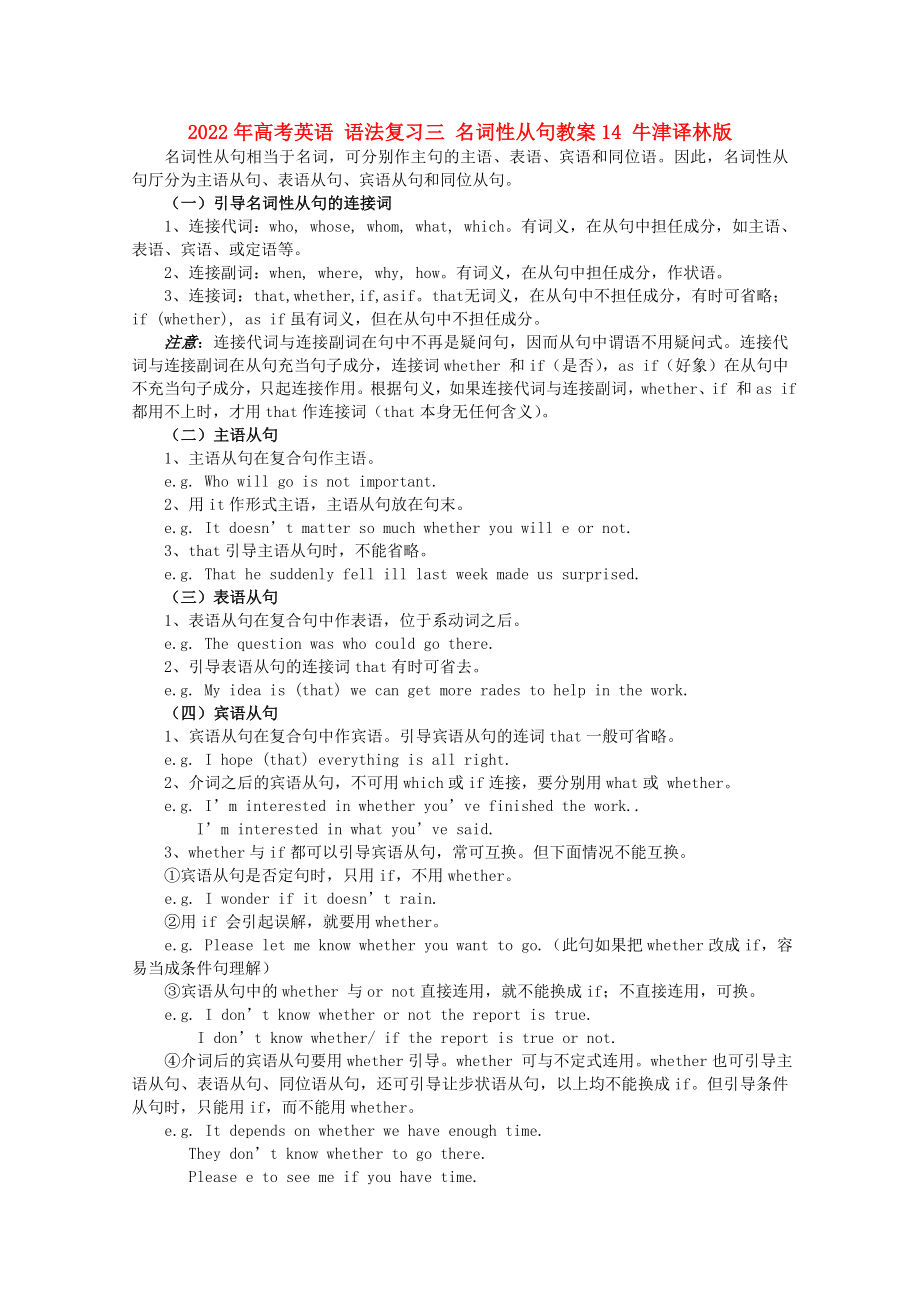《2022年高考英語(yǔ) 語(yǔ)法復(fù)習(xí)三 名詞性從句教案14 牛津譯林版》由會(huì)員分享,可在線閱讀�����,更多相關(guān)《2022年高考英語(yǔ) 語(yǔ)法復(fù)習(xí)三 名詞性從句教案14 牛津譯林版(2頁(yè)珍藏版)》請(qǐng)?jiān)谘b配圖網(wǎng)上搜索。
1�、2022年高考英語(yǔ) 語(yǔ)法復(fù)習(xí)三 名詞性從句教案14 牛津譯林版
名詞性從句相當(dāng)于名詞,可分別作主句的主語(yǔ)�、表語(yǔ)、賓語(yǔ)和同位語(yǔ)����。因此,名詞性從句廳分為主語(yǔ)從句����、表語(yǔ)從句����、賓語(yǔ)從句和同位從句。
(一)引導(dǎo)名詞性從句的連接詞
1���、連接代詞:who, whose, whom, what, which����。有詞義����,在從句中擔(dān)任成分�,如主語(yǔ)�、表語(yǔ)、賓語(yǔ)�����、或定語(yǔ)等��。
2���、連接副詞:when, where, why, how�。有詞義����,在從句中擔(dān)任成分,作狀語(yǔ)���。
3�����、連接詞:that, whether, if, as if�。that 無詞義,在從句中不擔(dān)任成分�,有時(shí)可省略;if (whether
2����、), as if雖有詞義,但在從句中不擔(dān)任成分����。
注意:連接代詞與連接副詞在句中不再是疑問句,因而從句中謂語(yǔ)不用疑問式��。連接代詞與連接副詞在從句充當(dāng)句子成分���,連接詞whether 和if(是否)��,as if(好象)在從句中不充當(dāng)句子成分,只起連接作用�。根據(jù)句義,如果連接代詞與連接副詞�,whether、if 和as if都用不上時(shí)�,才用that作連接詞(that本身無任何含義)。
(二)主語(yǔ)從句
1��、主語(yǔ)從句在復(fù)合句作主語(yǔ)。
e.g. Who will go is not important.
2���、用it作形式主語(yǔ)����,主語(yǔ)從句放在句末�。
e.g. It doesn’t mat
3、ter so much whether you will e or not.
3���、that引導(dǎo)主語(yǔ)從句時(shí)����,不能省略�����。
e.g. That he suddenly fell ill last week made us surprised.
(三)表語(yǔ)從句
1���、表語(yǔ)從句在復(fù)合句中作表語(yǔ)���,位于系動(dòng)詞之后。
e.g. The question was who could go there.
2�����、引導(dǎo)表語(yǔ)從句的連接詞that有時(shí)可省去。
e.g. My idea is (that) we can get more rades to help in the work.
(四)賓
4�、語(yǔ)從句
1、賓語(yǔ)從句在復(fù)合句中作賓語(yǔ)�����。引導(dǎo)賓語(yǔ)從句的連詞that一般可省略�。
e.g. I hope (that) everything is all right.
2、介詞之后的賓語(yǔ)從句���,不可用which或if連接����,要分別用what或 whether�。
e.g. I’m interested in whether you’ve finished the work..
I’m interested in what you’ve said.
3、whether與if都可以引導(dǎo)賓語(yǔ)從句���,常可互換�����。但下面情況不能互換。
①賓語(yǔ)從句是否定句時(shí)��,只用if�����,不用whet
5��、her�����。
e.g. I wonder if it doesn’t rain.
②用if 會(huì)引起誤解����,就要用whether。
e.g. Please let me know whether you want to go.(此句如果把whether改成if�����,容易當(dāng)成條件句理解)
③賓語(yǔ)從句中的whether 與or not直接連用�����,就不能換成if��;不直接連用,可換�。
e.g. I don’t know whether or not the report is true.
I don’t know whether/ if the report is true or not.
④介詞后的
6、賓語(yǔ)從句要用whether引導(dǎo)�����。whether 可與不定式連用���。whether也可引導(dǎo)主語(yǔ)從句�、表語(yǔ)從句�、同位語(yǔ)從句,還可引導(dǎo)讓步狀語(yǔ)從句��,以上均不能換成if�����。但引導(dǎo)條件從句時(shí)���,只能用if����,而不能用whether。
e.g. It depends on whether we have enough time.
They don’t know whether to go there.
Please e to see me if you have time.
(五)同位語(yǔ)從句
同位語(yǔ)從句在句中作某一名詞的同位語(yǔ)��,一般位于該名詞(如:news, fact, idea, suggestion, promise等)之后���,說明該名詞的具體內(nèi)容。
e.g. I have no idea when he will be back.
The fact that he had not said anything surprised everybody.
 2022年高考英語(yǔ) 語(yǔ)法復(fù)習(xí)三 名詞性從句教案14 牛津譯林版
2022年高考英語(yǔ) 語(yǔ)法復(fù)習(xí)三 名詞性從句教案14 牛津譯林版

